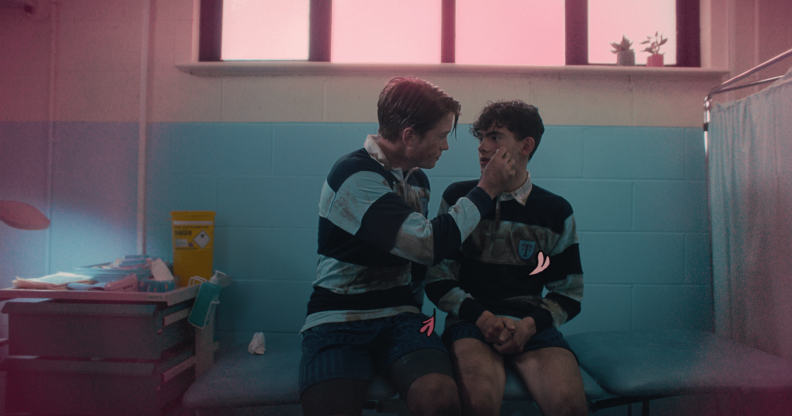Heartstopper is a game-changer for LGBTQ+ people who love sport: ‘I fell in love with it instantly’

Heartstopper’s Nick and Charlie have captured the world’s hearts. (Netflix)
Sam Picton, a volunteer for the LGBTQ+ young people’s charity Just Like Us, writes for PinkNews about how Heartstopper is groundbreaking for sport-loving queer folk.
I’m usually behind when it comes to new TV, accidentally skipping the hype before realising why everybody was so hooked, but I couldn’t delay watching Heartstopper.
I fell in love with it instantly – not just as an LGBTQ+ person, as many others have, but as an openly gay sprinter, too.
As someone who grew up being able to use sport as a positive outlet with regard to my sexuality, I can’t help but think about how the character of Nick Nelson, a bisexual rugby player played by Kit Connor, will help a lot of young LGBTQ+ men in sport.
There is an issue of homophobia in sport, particularly in men’s football – this is heightened by the striking lack of openly LGBTQ+ male footballers in England’s top four divisions.
There is a unique pressure on professional footballers to be open about their sexuality, rooted in a need for openly LGBTQ+ role models in English football – but coming to terms with their sexuality in an often homophobic and highly scrutinised space must hold enough weight as it is.
Even though I’m interested in it now, football was never my sport when growing up – in fact, I actually ran away from the idea of playing or watching it when I was younger because I was afraid that it didn’t include me.
Instead, my mum and dad gently directed me into athletics, never pushing me to be into football as much as they were. My positive outlet was and continues to be athletics, but there are still so many LGBTQ+ sportsmen who channel their feelings into football in the same way.
It’s upsetting that, at an elite level, these men do not feel able to be open about their sexuality.
Heartstopper tackles the pressure of coming out in sport so well, and the way that Nick navigates it is very moving to watch. Though he is surrounded by homophobic peers, including some of his rugby teammates, Nick always has control over who he lets in with regard to his sexuality.

Sam Picton. (Sam Picton/Just Like Us)
Of course, he struggles to feel comfortable with who he is at times, but he still maintains ownership of his sexuality and is liberated from the fear of being ‘outed’ as bisexual. I hope that any LGBTQ+ viewers who aren’t out understand that they have this control, too.
I believe that the notion of bisexuality needs to play a bigger part in the way that sexuality in sport is addressed, particularly as the conversation around being LGBTQ+ in men’s football always seems to focus on ‘openly gay professional football players’.
This should be repositioned so that it includes bisexual players too.
By validating Nick’s bisexuality for their young viewers to see, Heartstopper makes progress towards reaching this goal and expands the narrative around being LGBTQ+ in sport.
These boundaries are pushed further when Charlie, played by Joe Locke, joins the rugby team despite being nervous about his lack of ability. It demonstrates to young LGBTQ+ people that there is a place for them in sport even if they aren’t the ‘star player’.
The message is clear – as long as it makes you happy, you should feel comfortable enough to take part in sport as an LGBTQ+ person regardless of your performance.
A lot of work is being done to actively tackle homophobia in sport at both grassroots and elite level, but Heartstopper will help to reposition the conversation around being LGBTQ+ in sport through its positive representation.
This may not mean that a male player in England’s top four divisions is going to come out next week after watching, but it does give the next generation of talented LGBTQ+ athletes in football and other sports some of the tools that they need to take part in sport and begin changing the game when they reach an elite level.
As a result, the future of sport looks more inclusive than ever.

